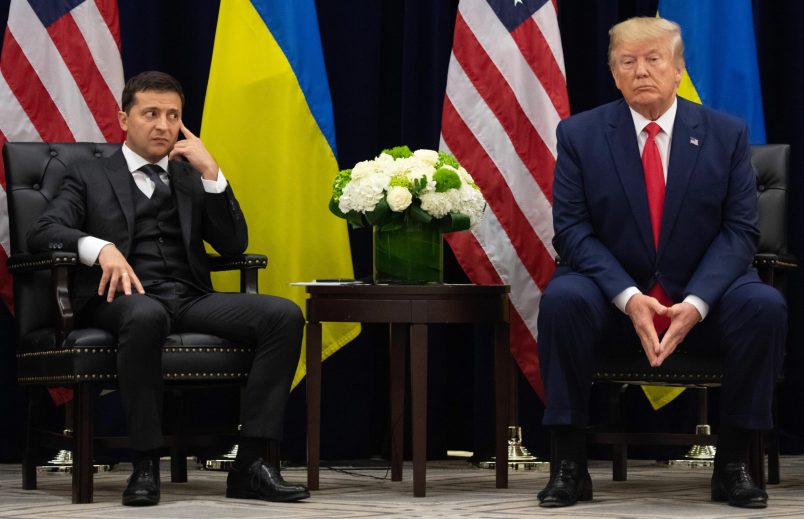A former Ukraine official told the New York Times that she learned of the Trump administration’s hold on military aid on July 30, a claim that undercuts a GOP talking point in defense of President Trump while corroborating other evidence in the impeachment probe that Ukraine was aware of the aid freeze before it was made known publicly.
The account of Olena Zerkal, a former deputy foreign minister who left the Ukrainian government last week, is the first on-the-record acknowledgment from a member of the Ukrainian government that it knew of the aid freeze soon after Trump’s July 25 call with President Zelensky, in which Trump requested investigations into his political rivals.
Zerkal described to the Times why the Zelensky administration wanted to avoid commenting on the pressure campaign in a way that would further strain Ukraine’s relationship with President Trump. The Zelensky administration has assumed the Senate will acquit the President if he is impeached and that he could be re-elected, she told the Times. She claimed that a top aide to Zelensky told her to “keep silent” on the matter, according to the Times. A Washington meeting she had planned with U.S. lawmakers in October was even canceled by the Zelensky administration, she told the Times, out of fear the topic would come up. Congressional aides confirmed the cancellation to the Times, while Zelensky’s press office did not respond to the Times’ questions about Zerkal’s account.
Zarkal resigned in protest of the Zelensky government’s handling of its relationships with the U.S. and Ukraine, according to the Times.
She told the Times that she learned of the aid freeze in a diplomatic cable from the Ukrainian embassy in Washington, and that she even read the cable aloud to top Ukrainian officials. She asked to discuss the cable with a senior Zelensky aide, she told the Times, while claiming that the Zelensky administration was also copied as a recipient of the cable.
Zarkal’s account is in line with last month’s congressional testimony of Laura Cooper, a top Department of Defense official. Cooper said that her staff received two messages on July 25 that indicated that the Ukrainian embassy was aware of an issue with the military aid. Later in August, Cooper’s staff was told by an embassy contact that the topic might come up in upcoming meeting with a Ukrainian official, though it ultimately did not.
Lt. Col. Alexander Vindman, a Ukraine expert on Trump’s National Security Council, also testified that it was his impression Ukraine knew of the freeze in the “early to mid-August timeline.”
Republicans have pointed to comments from Zelensky himself playing down knowledge of the aid freeze to defend Trump, claiming that Trump could not have been withholding the military assistance for investigations if Ukraine was unaware that the aid was on hold.
In his most recent public comments about the issues, Zelensky told Time and other outlets that he “never talked to the president from the position of quid pro quo.”
Yet he was still critical of the decision to withhold the assistance.
“I don’t want us to look like beggars. But you have to understand. We’re at war,” he said. “If you’re our strategic partner, then you can’t go blocking anything for us. I think that’s just about fairness. It’s not about a quid pro quo. It just goes without saying.







If we can only stick to the facts — looking at you cable news urchins — Trump is impeached and the GOP is discredited.
The GOP knows Ukraine is at war with a KGB colonel, his post-Soviet mafioso, and Russian invaders.
Their withholding military aid from Ukraine has zero to do with “corruption”.
If Republicans actually gave a damn about “corruption”, then they wouldn’t blurt out stuff like this:
https://twitter.com/Acyn/status/1201674758158352385
(h/t @inversion)
I see NATO, the Kurds, and South Korea in the “CC” line… but somebody forgot to copy Olena Zerkal on the memo that US strategic partnerships are now being run as protection rackets.
She’s a woman though. Are women even allowed to use fear as an excuse not to report abuse of power? /s
I think if he loves russia so much, he should get on a fucking flight there and surrender his passport to the U.S. embassy on arrival, renouncing his citizenship.